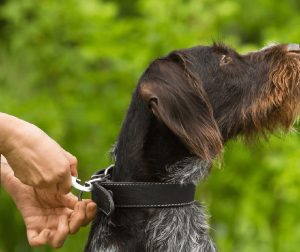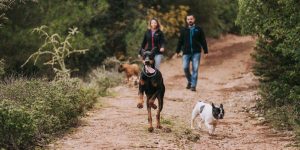Dog Walking Safety At Holidays4Dogs
Off-lead walking is one aspect of responsible dog ownership, but many people still allow their dogs to run wild, disturbing nesting birds, wildfowl and grazing farm stock. This Holidays4Dogs article will discuss dog walking safety and responsible dog ownership.
The majority of our approved Holidays4Dogs carers have access to rural areas where dogs can run safely off-lead. Some carers have acres of their own land, but it is the responsibility of clients to let carers know if their dog is likely to bolt for the hills.
When walking in areas frequented by other dog walkers, there is always the chance of meeting less responsible dog owners. Even if your dog is on the lead, this can pose problems. Not all dogs are friendly and sociable.
Likewise, it is an unfortunate fact that not all dog owners are responsible either. When the two meet, this can create a situation where conflict might ensue. It is a responsible practice, surely, to put your dog on the lead when approaching other dogs, people or livestock. This is particularly important if the other dog is on the lead.
Not all dogs need to meet and greet.
Dog walking safety is really important when walking dogs off the lead. Some people allow their dogs to charge at other walkers and their dogs.  This is irresponsible and often unpleasant for other dog owners. Not all dogs need to meet and greet and there might be several reasons why this is not possible.
This is irresponsible and often unpleasant for other dog owners. Not all dogs need to meet and greet and there might be several reasons why this is not possible.
It is always nice to meet fellow dog walkers and, indeed, new friendships can be forged. However, always ask first if it is ok for your dog to interact with theirs.
The other person’s dog might be old and infirm, nervous of unfamiliar dogs, lead reactive or, in training. Lastly, the dog owner themselves might simply want to be left alone to enjoy a peaceful walk.
Reactive/scared/frightened dogs.
This situation is most stressful for owners of reactive dogs who may have spent many months training their dogs. An off-lead dog running up close can set both dog and owner back weeks if not months. Many people only seem to think of their own dog.
However, if seems only fair to have empathy for other dogs who may be less confident or, even frightened. If your dog was frightened of being ambushed by other dogs – how would it make you feel? It always helps to put yourself in the shoes – paws! – of others.
The ‘Yellow Dog’ Scheme.
In the UK the Yellow Dog Campaign aims to raise awareness about these very issues associated with dog walking safety. The scheme was originally launched in Sweden in 2012 by Eva Oliversson, an international certified dog trainer and behaviourist.
The scheme has tirelessly campaigned for the colour yellow – i.e. yellow ribbons, leads, harnesses and vests – to represent dogs that need space. There is still a long way to go as many dog owners do not realise that a yellow-coloured dog lead means, ‘please keep your distance’. Whether dogs are friendly, or not, many people can find dogs rushing up to them intimidating.
Pack walking/walking multiple dogs.
Dog walking safety is particularly important when walking more than one dog. Consider the picture to the left. Would you find this worrying if you were walking towards this group along the path?
While the couple may shout that their dogs are friendly, yours may not be. This could, therefore, cause a lot of stress for the dog, as well as you.
At Holidays4Dogs we don’t think this is fair. We also disagree with pack dog walking on a commercial level for the very reasons we have outlined above.
We do not accept more than one dog at a time for home boarding, unless they are dogs from the same family.
All of our carers are evaluated for their experience with dogs. Safety is their paramount concern and all practice good dog walking etiquette. In addition, they know – and adhere to – local by-laws when in charge of guest dogs.
By-laws and legislation for dog walking safety.
For example, The Clean Neighbourhoods and Environment Act 2005, can impose fines of up to £1000 for not cleaning up after your dog. Most councils will have prominent signs up, so people should be aware of the rules. Dog excrement can cause disease in people and other animals.
In addition, The Road Traffic Act 1988 requires all dog owners to keep their dog on the lead on designated roads. Local authorities can extend this to other public areas such as, parks and recreation grounds. Therefore, it is always good to be aware of any information notices in your local area and keep up to date with any changes.
As well as this, the Control of Dogs Order 1992 requires that all dogs wear a collar and tag when out in a public place. The identification tag must include the name and address of the registered owner.
Holidays4Dogs guests must also wear one of our unique identification tags at all times.
Leads.
In terms of dog walking safety, an ordinary short lead is best for walking your dog. With written consent, we do walk guest dogs off the lead. This will be after a day, or two, of getting to know the dogs in our care. If you prefer to have your dog kept on the lead – this will always be adhered to.
We can only permit off-lead exercise to dogs who have a good recall and are friendly with other dogs. However, we also recommend flexi-leads as a good alternative for keeping dogs safe, while allowing some freedom. Always make sure these types of leads are of good quality and in working order – particularly before a dog stay.
Please be aware there are some considerations to think about when using retractable and dog walking safety. When walking near roads – keep the mechanism on the lock setting. These devices have been known to fail – sometimes with grave consequences. Better still use a short lead for walking near roads and swap to a flexi-lead when it is safe for your dog to have more freedom.
Walking your dog is one of the most pleasurable parts of dog owning, especially if it involves a dog friendly pub stop! Certainly, our Holidays4Dogs-approved carers thoroughly enjoy this part of looking after guest dogs.
Conclusion
Walking your dog is a marvellous opportunity to bond with your pet. For our Holidays4Dogs carers, it’s the best way to get to know their guest dogs.
Being observant and courteous means that we can have stress-free walks with our dogs. In addition, it’s great to be an ambassador for responsible dog ownership – the more of us who advocate it, the better.
Promoting dog walking safety and etiquette can not only benefit dog owners, but non-dog owners alike, – therefore, it is advantageous to everyone.
Holidays4dogs.co.uk and 4Dogs are participants in the Amazon Services LLC Associates Program, an affiliate advertising program designed to provide a means for sites to earn commission fees by advertising and linking to the following websites. Read our full disclosure agreement here https://www.holidays4dogs.co.uk/affiliate-disclosure/



